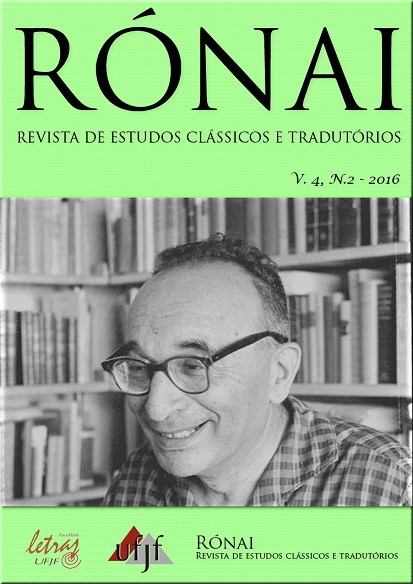Use, variation and norm in Priscian's Institutiones Grammaticae: a brief study on modern and ancient terms
Keywords:
variation, use, norm, PriscianAbstract
Our aim is, through an analysis of the book XVII of Priscian’s Institutiones Grammaticae, to compare the concepts of use, variation and norm, used by our author, to terms of same nomenclature, but used nowadays in the Linguistics Studies. Our research was developed by means of reading of the original Latin text, having as a support a translation of the text into French. Consequently, we could notice that the use of such terms in the Ancient Times seemed not to have this normative nature they have today, declaring these Linguistic uses, classified before as errors, as language variation, certified in the authors of golden literature era as well.
Downloads
References
FORTES, Fábio da Silva. Sintaxe Greco-romana: Prisciano de Cesareia e Apolônio Díscolo na história do pensamento gramatical antigo. Campinas, São Paulo: 2012.
NEVEU, Franck. Dicionário de ciências da linguagem. Traduzido por Albertina Cunha, José Antônio Nunes. Petrópolis, Rio de Janeiro: Vozes, 2008.
PRISCIANO. Institutionum Grammacarum libri XVII & XVIII. In.: Grammaire, livre XVII – syntax, 1. Traducion introduite et anotée par le Groupe Ars Grammatica. Librarie Philosophique J. Vrin: Paris, 2010.
[PS-CÍCERO]. Retórica a Herênio. Tradução e introdução Ana Paula Celestino Faria e Adriana Seabra. São Paulo: Hedra, 2005.
ROBINS, Robert Henry. The byzantine grammarians: their place in history. Berlin, New York: Mouton de Gryuter, 1993.
TRASK. R. L. Dicionário de linguagem e linguística. Tradução e adaptação de Rodolfo Ilari. São Paulo: Contexto, 2004.
Downloads
Published
How to Cite
Issue
Section
License
Copyright (c) 2017 Filipe Cianconi Rodrigues

This work is licensed under a Creative Commons Attribution 4.0 International License.
Copyright
The authors of the published contributions agree with the following items:
1. The authors keep the copyright and convey to the journal the right of first publication, the work being licensed under a Creative Commons Attribution License 4.0 International.
2. The authors are allowed and stimulated to publicize and distribute their work online after the publication in the journal, recognizing first publication in this journal.
3. The authors of the approved works authorize the journal to distribute their content, after publication, for reproduction in content indexes, virtual libraries and similars.
For more information about Creative Commons Attribution License 4.0 International, please, go to: https://creativecommons.org/licenses/by/4.0/deed.en
Editorial exemption
The authors of the published contributions are entirely and exclusively responsible for their contents. Its content does not represent an official position of Rónai - Revista de Estudos Clássicos e Tradutórios neither of Faculdade de Letras da Universidade Federal de Juiz de Fora or their partner institutions.



